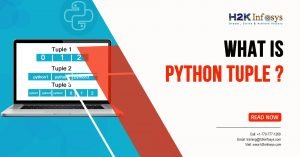If you’re looking to learn Python effectively, understanding Python functions is one of the most critical steps. Whether you’re automating a task, building a web application, or analyzing data, Python functions help you organize code into manageable, reusable blocks. That’s why they’re an essential topic in any Python training certification.
Let’s take a deep dive into Python functions, their purpose, structure, and real-world applications, while also equipping you with hands-on examples to make your learning journey practical and industry-relevant.
Why Learn Python Functions?
Imagine trying to build a car without using reusable parts it would be inefficient and exhausting. The same logic applies to programming. Python functions are like reusable parts of a machine. They save time, reduce redundancy, and make your code more readable.
According to Stack Overflow’s Developer Survey, Python remains one of the top 5 most-used programming languages globally. A key reason for its popularity is the simplicity and power of Python.
What is a Function in Python?
A Python function is a block of organized, reusable code that performs a specific task when called. Functions allow you to break a large program into smaller, manageable pieces.
Basic Syntax of Python Functions:
pythondef greet():
print("Hello, welcome to H2K Infosys!")
In this example:
defis a keyword that defines a function.greetis the function name.- The parentheses
()indicate that this function does not take any arguments. - The indented code block is the function body.
Types of Python Functions
This are categorized into two main types:
1. Built-in Functions
These are pre-defined in Python and ready to use. Examples include:
print()len()type()input()
2. User-Defined Functions
Created by the programmer using the def keyword. Example:
pythondef add(a, b):
return a + b
How to Use Python Functions Effectively: A Practical Guide
Let’s break it down with steps and examples.
Step 1: Define the Function
Use the def keyword and give your function a name that describes its purpose.
pythonCopyEditdef calculate_area(length, width):
return length * width
Step 2: Call the Function
Once defined, call it by its name and provide the required arguments:
pythonresult = calculate_area(5, 3)
print("Area:", result)
Output:
makefileCopyEditArea: 15
Function Parameters vs. Arguments
- Parameters are variables listed inside the parentheses in the function definition.
- Arguments are the actual values passed to the function.
pythondef greet_user(name): # name is a parameter
print(f"Hello, {name}!")
greet_user("John") # "John" is the argument
Real-World Use Cases of Python Functions
Data Analysis
pythondef calculate_mean(data):
return sum(data) / len(data)
Game Development
pythondef move_player(x, y):
print(f"Player moved to {x}, {y}")
Web Applications
In frameworks like Flask or Django (no need to use names in this blog), Python functions handle user requests and return responses.
Advanced Python Function Concepts
As you advance in your Python training online, you’ll encounter more sophisticated function types:
1. Default Arguments
pythondef greet(name="Guest"):
print("Hello", name)
2. Keyword Arguments
pythondef employee_info(name, age):
print(f"{name} is {age} years old")
employee_info(age=30, name="Alice")
3. Arbitrary Arguments
pythondef total_sum(*args):
return sum(args)
print(total_sum(1, 2, 3, 4))
Scope of Variables in Python Functions
🔹 Local Scope
Python Variables defined inside a function are accessible only within that function.
pythondef greet():
name = "H2K Student"
print("Hello", name)
🔹 Global Scope
Variables defined outside all functions are global and accessible everywhere in the program.
Lambda Functions – Short & Sweet
A lambda function is a small anonymous function:
pythonadd = lambda a, b: a + b
print(add(5, 3)) # Output: 8
They are often used for short operations like sorting or filtering lists.
Industry Use of Python Functions
- Automation Engineers create reusable scripts using Python functions for test automation.
- Data Scientists write analytical functions for processing data sets.
- Web Developers organize web app logic through modular functions.
A recent report by IEEE Spectrum ranks Python as the No. 1 language across multiple industries, and the efficient use of Python functions is cited as one of the key factors.
Hands-On Example: Build a Calculator
pythondef calculator(a, b, operation):
if operation == "add":
return a + b
elif operation == "subtract":
return a - b
elif operation == "multiply":
return a * b
elif operation == "divide":
return a / b
else:
return "Invalid Operation"
print(calculator(10, 5, "add")) # 15
print(calculator(10, 5, "subtract")) # 5
Best Practices for Writing Python Functions
- Use meaningful names for your functions and parameters.
- Keep functions small and focused on a single task.
- Use comments and docstrings to explain functionality.
- Avoid redundant code by reusing functions.
Career Advantage: Why Mastering Python Functions Matters
- Job-Ready Skill: Most job roles requiring Python, such as Data Analyst or Software Developer, expect you to know how to write and use Python functions.
- Interview Prep: Coding interviews often focus on function design, recursion, and optimization.
- Project Efficiency: Good use of functions makes collaborative and large-scale projects more manageable.
If you’re planning to pursue a Python training certification, having a strong grip on Python functions will greatly enhance your learning outcomes.
Recap: Python Functions in Action
Here’s a quick checklist of what you’ve learned:
What are Python Functions?
Why functions matter in programming
Syntax and usage
Real-world applications
Advanced topics like lambda and scope
Tips for writing better functions
You’ve now taken an essential step to learn Python effectively and build a solid programming foundation.
Key Takeaways
- Python functions are reusable blocks of code that perform specific tasks.
- They enhance code readability, modularity, and reusability.
- Mastering Python functions is critical for real-world application development.
- Whether you’re learning Python for automation, data science, or web development, functions are non-negotiable.
Ready to Master Python Functions with Real Projects?
Join H2K Infosys’ Python training online today for expert-led lessons, hands-on projects, and full career support.
Get certified and start building real-world applications with confidence!


























